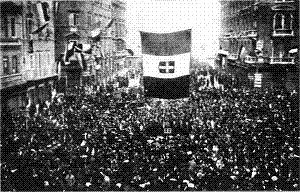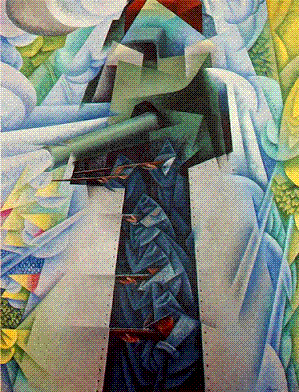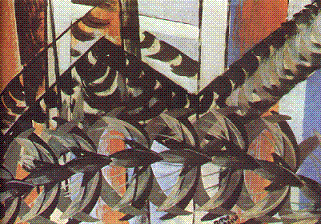A walk around the Estorick permanent collection of modern Italian art in London with Franco Berardi
EE: We are standing in front of Giulio Gigli's Dynamic Vision of Befana circa 1914–1915, a vibrantly coloured abstract piece, one of the elements of which is a bullet on which Marinetti's name is written.
What do you make of the confrontational aspects of Marinetti's manifesto in respect to feminism; did this aim to offend in the way that someone may today make a politically incorrect joke: a challenge to accepted norms?
FB: You cannot judge the manifesto of 1909 by the point of the view of our contemporary consciousness. In some respects the manifesto – especially the point on the war – is almost embarrassing. What is interesting about it is not so much the content but the perception of the coming age; mechanisation and acceleration implied contempt for women. Today we can see this was a paradoxical consciousness of industrialisation and modern capitalism that was destroying the sensibility of women. To say in a provocative way: the fascism of that pronouncement was a symptom of a very acute perception of what was going on (the forthcoming war).
EE: There was a youthful arrogance to the futurists, don't you think?
FB: Yes, it was a very masculine arrogance, one that belongs to a big part of the avant-garde of the 20 th century - and also to the Russian avant-garde. On this subject the protofascist feelings of the futurists were not so far from the feelings of the communists, although you cannot deny that the Majakovsky's attitude is absolutely different, when it comes to the sensibility, to the perception of the other. Think to the letters he wrote to Lilja Brik, think of his tenderness and fragility in the field of love.
But let me tell you about Fiume in 1919. It's a very interesting experience, which shows the proximity of the Italian futurism to the international revolution of those years. At the end of the war, at the peace congress of Versailles , the Italian Foreign Minister Giorgio Sonnino asked for the concession of Dalmatia, and Istria, the triangle between Trieste and Yugoslavia . At the time, the Italians were treated by the French and the British with derision and nobody took the request seriously. The Italian Foreign Minister broke down in tears and left, which made history. Italy was absent at the end of the Congress of Versailles. This is the basic feeling of fascism: the Italian proletariat fought and won the war but Italians are considered as proletarians so we are not given what is ours, Fiume . You see here the rising of the fascist idea of a maimed victory (vittoria mutilata) that was so important in the propaganda of Mussolini.
Then a group of futurists led by Gabriele D' Annunzio - an Italian poet who deserves to be known - who was influenced by the symbolist movement and was not a futurist himself but close to the futurists, went with a militia private army to Istria, occupied the city of Fiume and declared the Free Republic of Fiume, allied with the communist Soviet Union. They were the ones to declare the first alliance with the rising communist party.

I would say that in the experience of Fiume a lot of people were coming from anarchist internationalism, such as Bakunin and Malatesta, with the intention to create an alliance with those who were themselves in so many ways Italian proletarians (the word fascism did not exist yet).
EE: Did it manifest itself in language too, like in Russia? Did they develop their actually develop their own particular cultural forms and languages or was it a Utopian pipe dream?
FB: The Italian experience of futurism emphasises the problem of nationalism; that does not exist in the Soviet Union . But if you look at things from the standpoint of fascist consciousness, this is not the mark of the history of futurism. If you ask me what the overall character of futurism is I would say that it is a sequel of symbolism. I see an important relationship between symbolism and futurism in the idea that words are things, objects; they are not simple signifiers of signified, but signs. The symbolist idea of correspondence is important, that general perception of the universe, for instance, Mallarm é's idea of the word as evocation, but also Mayakovski's notion of the word as a stone. In this respect, both symbolism and futurism are the ancestors of advertising. The issue for symbolism and futurism is advertising rather than politics. So I am aware of the differences between them but I think they are less important than the similarities. On the political ground the analogy is important but it was not perceived then as well as it is now.
EE: There are much more, let's say, politically secular explanations, such as the development of moving pictures, of photography and the technology that allowed for this kind of art, but your emphasis has been on the politics of proletarian power, does this explain the masculine bias of the Italian futurism?

EE: So if you have this new ability of representing images through moving pictures why use the conventional surface to express movement and acceleration? Is it the challenge?
FB: It is not a question of instrumentality but a question of sensibility. You can be a painter who feels things this way, in a way that is influenced by the birth and rise of cinema, this is a particular feature of Italian futurism, much more than Russian futurism. And there also is advertising: Bragaglia and Depero were involved in the first trademarks of Italy , such as Martini, Campari, Fiat. These are all futurist productions. Many other brands were created by them.
EE: This really relates to branding because with brands you can reduce a variety of different kinds of objects to an abstract symbol bringing lots of things under the same heading. There is a functional element behind abstraction that is about representation and identity. Can you explain the transition from symbolism to futurism?
Symbolism emancipates the poetic word from all functions of representation in favour of the evocative function. The Russian version of symbolism results into mysticism: whilst French symbolism aspires to a formal 'distillation' of evocative beauty, Russian symbolism pushes towards an intuitive apprehension of the other worldly and tries to turn the word into a mystic epiphany of the absolute. Whilst Mallarmé's language is an exercise on the threshold of nothingness and his word has the power to make things disappear, the language of Severjanin, Belji or Blok evokes the other worldly truth that transcends that of the present world.
Symbolism is concerned with effects and futurism recognises the word as an autonomous object and as matter with a non referential value, capable of producing effects thanks to its intimate a-signifying powers. The word becomes a graph, a visible sign, and erupts on the scene of everyday life, on the facades of buildings and the sides of moving trains. Symbolism had severed all ties with literary realism and claimed that the poetic word is not denotative of an object but evocative of refined and infinite worlds. Futurism follows on the same premises but to the veils and wilted flowers of a whispering and faintly symbolism, it substitutes roaring engines, war explosions and slaps in the face of public taste.
The affinities between symbolism and futurism are much more interesting than their differences, as Chlebnikov demonstrates. Velemir Chlebnikov joined the futurist movement and was a friend of Majakovski during the years of / budetljane / : amongst the futurists he was the closest to the sensibility of symbolism.
Chlebnikov liked travelling on trains between villages in Russia , and loved archaic forms of life. He was close to the magic-shamanic practices of traditional deep Russia and wanted to create a virtually global language that could be understood beyond nationalist and linguistic borders. He named this language Zaum, and with this word he described an emotional trans-linguistic language. Zaum is seduced by pre-symbolic forms of communication, a proto-linguistic vocalism and original emotional language, but it is also open to the imagination of a communication that is post-symbolic, a telepathic technology so to speak. Symbolism and futurism converge on the imagination of linguistic utopia where archaism and future are confused.
Would you say that the British experience of the 10 years of the war there is something comparable to futurism?
EE: I don't think there is. There are comparable political contexts; you have the power of labour so strong that it is upsetting the constitutional framework. Increasing union activity and strikes bring about the breakdown of the traditional mechanism of parliament but the response to this was war.
FB: So art and culture did not share the same values of the leading class on the subject of war. Do you know Yeats' poem, The second coming ? Don't you think this is a kind of fascist perception, when he says thanks to the war things are changing and the Messiah is coming again? And he refers to the Russian revolution; it's a poem of 1919.
Turning and turning in the widening gyre
The falcon cannot hear the falconer;
Things fall apart; the centre cannot hold;
Mere anarchy is loosed upon the world,
The blood-dimmed tide is loosed, and everywhere
The ceremony of innocence is drowned;
The best lack all conviction, while the worst
Are full of passionate intensity…
EE: My instinct is to say that because of empire you don't have the same view of militarism. Britain was still reeling from the Boer war in 1906, although they won, the army was decimated and the experience had been something like a punch on the nose - the idea of imperial strength and invincible machines had been partially undermined in the public imagination. Likewise with severe domestic political problems, Britain did not militarise in the same way as other nations in the lead up to World War One. The original group of soldiers that went over when the war started was very small. There was a ‘beat the Bosch' attitude but no hunger for it in the general public, it had to be drummed up. But maybe this is not what you are asking. But at any rate the British are pretty dismissive of the avant-garde at the time, they see it as nasty and an aberration, the art celebrated here is often nostalgic about pre-industrial times.
FB: I see that the context is different; the United Kingdom knows the difficulties of managing and empire.
EE. Do you see these images in Italy ?
FB. Some of them I have seen already. This one is obvious. There are many like it: we are fighting and the Bourgeoisie is complaining and drinking champagne.
EE. There is a soldier with a gun asking ‘Shall I just be an extra or take a starring role?'
FB. Yes, the Italian question: we want to be an actor, they want us to be an extra.
EE. I saw it from the point of view of the soldier: shall I go and do something heroic or just turn up and die?
FB. Ah, cowardice. Italy was allied with the Germans and the Austrians until 1914. When the war broke out Italy withdrew from the alliance with them and took time to think about it and see how the situation developed. Then they entered the war on the other side. The same happened with the Iraq war: Berlusconi decided to enter the war exactly when Bush declared to have won it; and the same with Mussolini, who entered on the side of Hitler after he had invaded France. It's not a nice story …
Severini, Armoured train (1915)
But Could You?
I blurred at once the chart of trite routine
by splashing paint with one swift motion.
I showed upon a plate of brawny glutin
the slanting cheekbones of the ocean
Upon the scales of tinny fishes
new lips summoned, though yet mute.
But could you
play
right to the finish
a nocturne on a drainpipe flute?
? ?? ????? ???
? ????? ?????? ????? ?????,
????????? ?????? ?? ???????;
? ??????? ?? ????? ??????
????? ????? ??????.
?? ????? ???????? ????
?????? ? ???? ????? ???.
? ??
??????? ???????
????? ??
?? ?????? ??????????? ?????
Mayakovski (1913)
Balla, Volo di rondini (1913)
Retrosi, The face of war (1915-1918)


